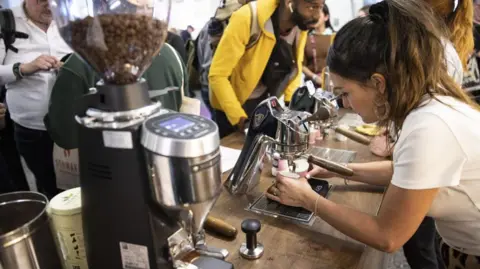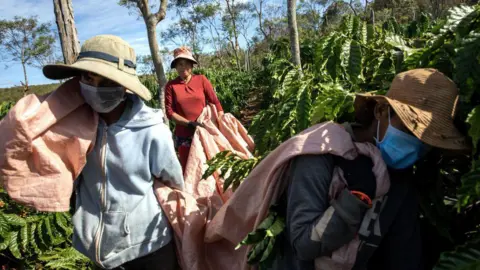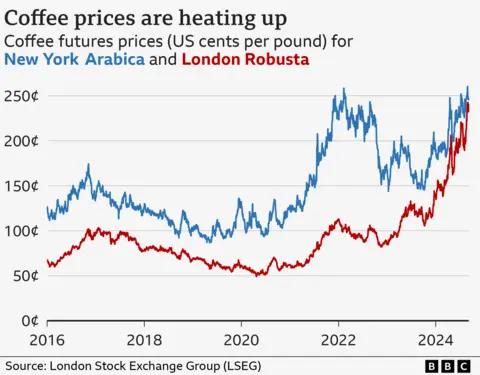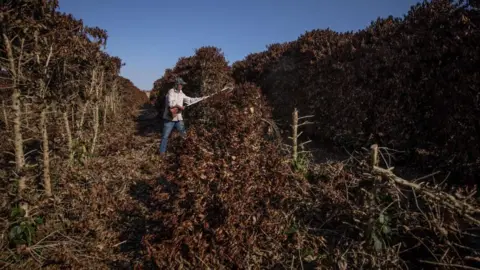How the world's smelliest fruit is making coffee more expensive
 Getty Images
Getty ImagesHow much is too much for a caffeine fix?
A cup of coffee as expensive as £5 in London or $7 in New York may be unimaginable to some – but it could soon become a reality thanks to a “perfect storm” of economic and environmental factors in the world's top coffee-producing regions.
Analyst Judy Ganes said the price of untraded beans on the global market was now at “historically high levels”.
Experts blame a combination of problematic crops, market forces, depleted stocks – and the world's smelliest fruit.
So how did we get here, and how much will it affect your morning latte?
In 2021, a freak blizzard wipes out the coffee crop in Brazil, the world's largest producer of the Arabica beans — commonly used in barista-made coffee.
Shortages of these beans mean buyers have turned to countries like Vietnam, primary producers of robusta beans, which are commonly used in instant mixes.
But farmers there faced the region's worst drought in nearly a decade.
According to Will Firth, a coffee consultant based in Ho Chi Minh City, climate change is affecting the growth of coffee plants, which in turn affects bean yields.
And then Vietnamese farmers turned to a smelly, yellow fruit – the durian.
 Getty Images
Getty ImagesThe result is Prohibited on public transport Proving popular in China – due to its aromas in Thailand, Japan, Singapore and Hong Kong.
And Vietnamese farmers are replacing their coffee crops with durian to cash in on this emerging market.
Between 2023 and 2024, Vietnam's durian market share in China almost doubled, and some estimate the crop to be five times more profitable than coffee.
“Vietnamese farmers have a history of being volatile in response to fluctuating market prices, overcommitting and then flooding the market with their new crop quantities,” Mr Firth said.
As they flood China with durian, robusta coffee exports were 50% lower in June than the previous June, and stocks are now “nearly low”. According to the International Coffee Organization.
Exporters in Colombia, Ethiopia, Peru and Uganda have advanced, but haven't produced enough to ease a tight market.
“Right here [the] “When things started to pick up for Robusta demand, that's when the world was scrambling for more supply,” Ms Ganes explained.
This means that Robusta and Arabica beans are now trading at record highs on commodity markets.
Storming the liquor market
Is the shift in the global coffee economy really affecting the price of your coffee on the high street? Short answer: possibly.
Wholesaler Paul Armstrong believes coffee drinkers could soon face the “crazy” prospect of paying more than £5 in the UK for their caffeine fix.
“It's a perfect storm at the moment.”
Mr Armstrong, who runs East Midlands-based Carrara Coffee Roasters, imports beans from South America and Asia, which are then roasted and shipped to cafes around the UK.
He told the BBC he had recently raised his prices, hoping it would account for the high asking prices – but said costs had “only intensified”.
He added that with some of his contracts expiring next month, the cafes he serves will soon have to decide whether to pass on the higher costs to their customers.
Mr Firth said some parts of the industry would be more exposed than others.

“It's really commercial volume coffee that's going to experience the most disruption. Instant coffee, supermarket coffee, stuff at gas stations — it's all going up.”
Industry statistics warn that higher market prices for coffee do not necessarily translate into higher retail prices.
Felipe Barreto Croce, CEO of Brazil's FAFCoffees, agreed that consumers are “feeling the pinch” as prices rise.
But he argues that “mostly due to inflation in general”, such as rent and labour, rather than the cost of beans. Consultancy Allegra Strategies estimates that beans contribute less than 10% of the price of a cup of coffee.
“Coffee is still very cheap, as a luxury, if you make it at home.”
He also said that rising prices for low-quality beans meant that high-quality coffee could now be seen as better value.
“The difference is if you go to a specialty coffee shop in London and get a coffee, get a coffee at Costa Coffee [in price] Between that cup and specialty coffee is much smaller than before.”
However, there is hope of lower prices on the horizon.
The future is losing ground
According to Mr Croce, the upcoming spring harvest in Brazil, which produces a third of the world's coffee, is now “crucial”.
“Everyone is looking at when it will rain,” he said.
“If they come back early, the plants should be quite healthy and the flowers should be good.”
But if it rains in late October, he added, yield forecasts for next year's crop will drop and market pressure will continue.
In the long term, climate change poses serious challenges to the global coffee industry.
 Getty Images
Getty ImagesA Study From 2022 it was concluded that even if we drastically reduce greenhouse gas emissions, the area most suitable for coffee cultivation could be reduced by 50% by 2050.
One measure of future-proofing the industry Mr Croce supports is a “green premium” – a small tax on coffee paid to farmers to invest in regenerative farming practices, which help protect and maintain the viability of farmland.
So flavored fruit is partly to blame for rising prices now – a changing climate could ultimately put pressure on coffee affordability in the coming years.


